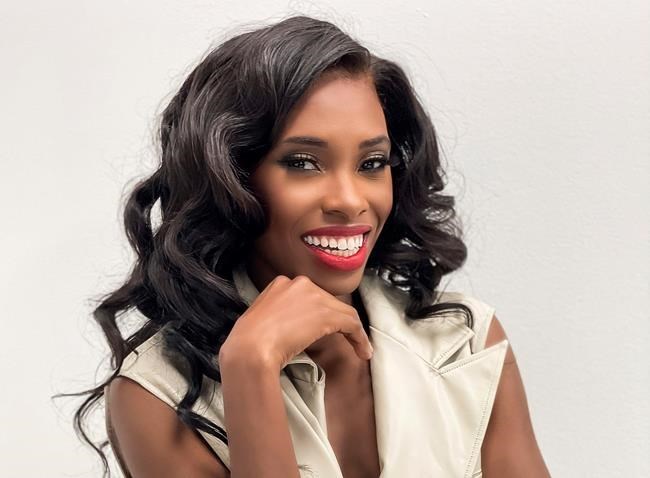
This photo provided by Andrea Pitter, shows Andrea Pitter, designer and founder of Pantoral Bridal. Pitter recently joined global wedding planning company the Knot as part of a program to boost minority professionals in the industry. (Andrea Pitter via AP)
March 14, 2021 - 10:00 AM
NEW YORK - Designer Andrea Pitter's boutique, Pantora Bridal, has tripled in size since opening in Brooklyn seven years ago as a safe space for Black women, who have been overlooked by the wedding industry. Her creations feature mesh that complement different skin tones and silhouettes that embrace all body types. She has been featured in Vogue Paris, Brides and Essence, and her designs are now carried by Kleinfeld, the world's largest luxury bridal retailer.
This year, she joined global wedding planning company The Knot as a mentor in a new program for minority wedding professionals. The Knot also created filters on its website that allows vendors to identify themselves as minority-owned, woman-owned, LGBT-owned and veteran-owned.
But Pitter, a graduate of the Fashion Institute of Technology, remembers a difficult and often lonely start to her career. She initially stopped attending trade shows and courting other retailers, finding that there was resistance to her as a Black designer. The lack of diversity in the wedding industry drew attention two years ago when The Knot and other wedding planning sites changed their policies on promoting former slave plantations as venues, responding to a campaign from advocacy group Color of Change. Now, the wedding industry has been badly hit by the coronavirus pandemic.
This interview has been edited for length and clarity.
Q: Can you tell me about the inspiration behind your brand?
A: Black women are generally always underrepresented, and I wanted to make sure they felt seen and acknowledged. We’ve had brides come to our store where they have been to other locations and people are telling them the dress can’t fit them, or maybe you should wear an A-line because you don't want your hips to show or your hips are too big. And we're like, “Too big? There's no such thing as too big for a mermaid dress if you've got your booty showing!"
Q: What are the sort of misperceptions about Black couples that you see in the media and wedding industry?
A: Most of the time the media will portray it as though Black men are not in the household, and that’s simply not true. I know that because I grew up with a Black man in the household. It’s really important that people understand that Black love actually does matter. Black women do in fact get married. That's the reason I built my business.
Q: What were some of the challenges you faced early on in your career?
A: I went to a bridal market (a trade show) twice and on both of those occasions I would be the “only," or one of a few. A lot of advice that was given to me was that I should put a white sales representative in your booth, or you shouldn't be there. It felt very lonely. I felt excluded in so many ways. Of course, I was a little green in the industry, but there were instances when people found out that I was the designer that they were no longer interested in the brand.
Q: What is your new role at The Knot?
A: They have welcomed me with open arms and taken me as I am. They have taken my feedback on anything that needs to change. I'm going to be a mentor for their fellowship program. And they put me in a position where I can tell my story and for others to relate to what it's like to fight to be in this industry and to stay and succeed.
Q: Would initiatives like The Knot's diversity filters have helped you when you started out?
A: Because my brand is really supported, and I would say, ramped by Black women, I think it definitely would have been helpful because when I first started, women were looking for me but just didn't know where and how to find me. The filters are going to be really important for people who are now really being intentional with how they spend their dollars.
Q: How do you view the future of Black businesses, professionals and families at a time when the pandemic has hit them hard?
A: I think there is a big focus on inclusion right now and we need to take advantage of that. One thing I can always do is count on Black people. I'm very optimistic about how we survive and have always survived.
Q: How has the pandemic affected your own business?
A: I’ve had to redesign the last collection we put out. Typically, I drop 60 to 75 dresses in one collection. I had to tighten up the number of dresses and decide that we would do releases every two months just to understand exactly where the trend is going. They are no longer having these 100 to 150 person-attended weddings. They are now having weddings in the park with maybe 20 or 30 people. We had to bring in some styles that were a little bit toned down.
News from © The Associated Press, 2021